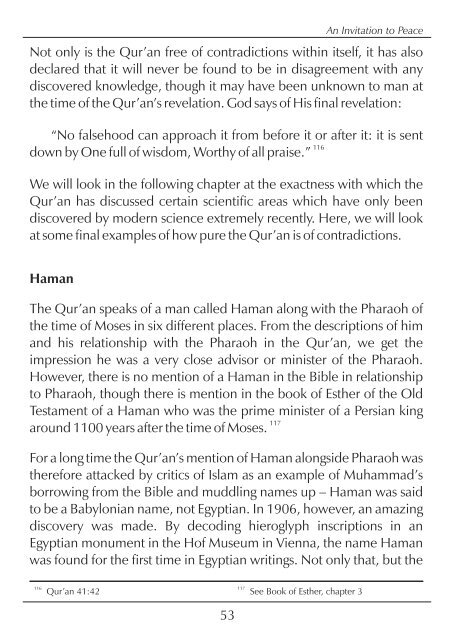An Invitation to Peace
http://www.islamicglobe.com
http://www.islamicglobe.com
Create successful ePaper yourself
Turn your PDF publications into a flip-book with our unique Google optimized e-Paper software.
<strong>An</strong> <strong>Invitation</strong> <strong>to</strong> <strong>Peace</strong><br />
Not only is the Qur’an free of contradictions within itself, it has also<br />
declared that it will never be found <strong>to</strong> be in disagreement with any<br />
discovered knowledge, though it may have been unknown <strong>to</strong> man at<br />
the time of the Qur’an’s revelation. God says of His final revelation:<br />
“No falsehood can approach it from before it or after it: it is sent<br />
116<br />
down by One full of wisdom, Worthy of all praise.”<br />
We will look in the following chapter at the exactness with which the<br />
Qur’an has discussed certain scientific areas which have only been<br />
discovered by modern science extremely recently. Here, we will look<br />
at some final examples of how pure the Qur’an is of contradictions.<br />
Haman<br />
The Qur’an speaks of a man called Haman along with the Pharaoh of<br />
the time of Moses in six different places. From the descriptions of him<br />
and his relationship with the Pharaoh in the Qur’an, we get the<br />
impression he was a very close advisor or minister of the Pharaoh.<br />
However, there is no mention of a Haman in the Bible in relationship<br />
<strong>to</strong> Pharaoh, though there is mention in the book of Esther of the Old<br />
Testament of a Haman who was the prime minister of a Persian king<br />
117<br />
around 1100 years after the time of Moses.<br />
For a long time the Qur’an’s mention of Haman alongside Pharaoh was<br />
therefore attacked by critics of Islam as an example of Muhammad’s<br />
borrowing from the Bible and muddling names up – Haman was said<br />
<strong>to</strong> be a Babylonian name, not Egyptian. In 1906, however, an amazing<br />
discovery was made. By decoding hieroglyph inscriptions in an<br />
Egyptian monument in the Hof Museum in Vienna, the name Haman<br />
was found for the first time in Egyptian writings. Not only that, but the<br />
Qur’an 41:42 See Book of Esther, chapter 3<br />
116 117<br />
53














